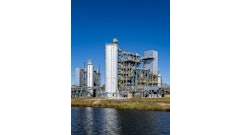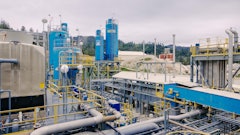
Most industries are making efforts to move closer to more sustainable operations, as the threat of global warming and greenhouse gas (GHG) emissions grow more urgent. The construction industry is emerging as a major advocate for this transition, given that it is responsible for almost 39% of CO2 emissions worldwide, based on estimates from the World Green Building Council. A major part of this effort is the rise of green construction.
The benefits of green buildings are vast; they consume less water, energy and other natural resources than conventional buildings. Since green construction is characterized by its compliance with stringent sustainability standards and codes, building thermal insulation (BMI) has become a key metric for the design of such structures.
Thermal insulation in buildings is beneficial in numerous ways, from moderating temperatures inside a building to decreasing energy consumption during heating and cooling by as much as 35%. Additionally, thermal control has a mitigating effect on CO2 emissions due to moderated power and fuel consumption, making it essential for the development of energy-efficient green buildings. According to a report from Global Market Insights Inc., the global building thermal insulation market is poised to cross $35 billion by 2028.
Growing Focus on Industrial Construction Development
The construction industry is one of the most crucial elements of the modern economy, which is one of the main reasons behind its resilience and constant evolution. Despite facing a significant setback during the upheaval caused by the COVID-19 pandemic, industrial construction projects, particularly food processing plant development, have continued to grow exponentially over the past year.
Food processing involves several thermal processing techniques like pasteurization, roasting and frying, which operate at temperatures as high as 657°C, as well as cooling processes like blast chilling and freezing where temperatures often go as low as -18°C. As a result, thermal insulation in buildings used for food processing is essential to maintaining the freshness of goods and protecting profitability.
To that end, leading manufacturers of insulation products are making significant efforts to develop thermal insulation solutions designed to address the needs of high-performance structures like food processing plants.
Roof Insulation to Contribute to Building Sustainability
Among the various components integral to the resilience of a constructed structure, the roof is an undeniably critical part, given its ability to protect the building against threats like extreme weather. The strength of walls and even foundations of any well-constructed building rely heavily on a properly installed and maintained roof. Since roofs are an essential defense element for shielding construction against harsh elements, thermal insulation solutions are paramount for roofing applications. According to Global Market Insight Inc. projections, the building thermal insulation market from the roof insulation segment is expected to register remuneration worth almost $11 billion by 2028.
In construction, the roof is responsible for around 25% of heat loss. Roofs are also exposed to direct contact with a host of environmental pressures, from rain to the sun to snow, which can have potentially detrimental and damaging impacts on the structure’s integrity. In this situation, thermal insulation is a viable solution to mitigating the risk of these impacts and generating more energy savings.
Flat roofing is gaining prominence as a preferred roofing style in several construction markets worldwide. Since this roofing design has marked differences from traditional sloped roofs, it is becoming essential for developers to implement the ideal thermal insulation solutions for these structures to prevent water damage and remain energy efficient.
In recent years, the significance of thermal insulation in buildings has grown tremendously, mainly due to the rapid evolution of insulation standards across the globe. These standards are putting immense pressure on the construction industry to enhance thermal resistance and curb energy losses, which in turn in will lead to numerous growth opportunities for BIM market players.



















